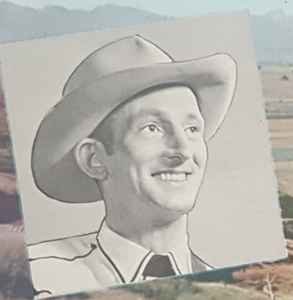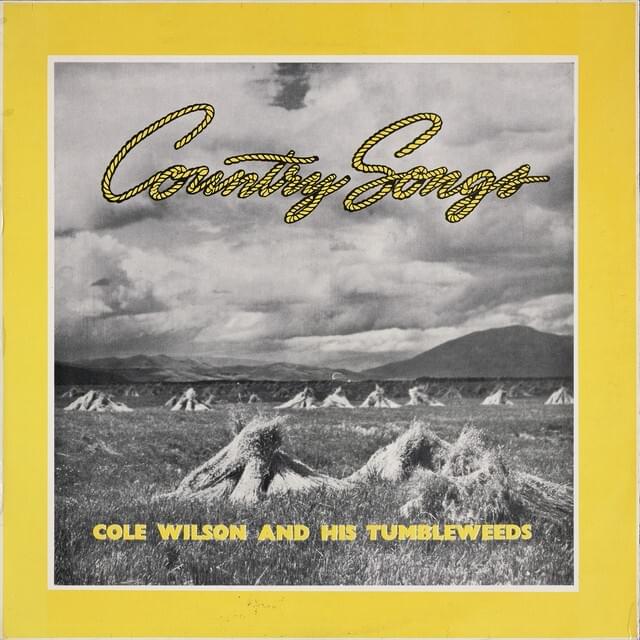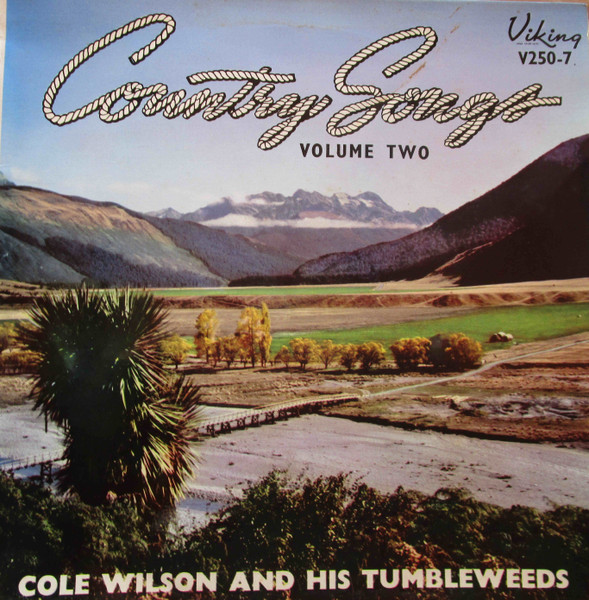Graham Reid | | 3 min read
Blue Eyes Crying in the Rain

Pulling albums from the shelves at random for this column is, of course, not without its risks.
Sometimes you get to greet a familiar friend, other times you encounter barely known strangers.
And then . . .
Then you pull out Cole Wilson and His Tumbleweeds' first album of country songs, and so you might as well listen to the second volume which was right beside it.
Wilson was a major figure in New Zealand country music from the Fifties onward, and perhaps – given how the word “country” is interpreted these days – we should more correctly describe his music as country and western.
His music came from the tradition of the Carter Family, Jimmie Rodgers, Tex Morton and Hank Williams in the age of Hopalong Cassidy and Roy Rogers movies.
Wilson had actually been piggy-backing on another popular genre, Hawaiian music, when he turned his attention to country and western.
 With lap steel guitar player Colin McCrorie they recorded four albums of Hawaiian music as Colin McCrorie's Kalua Islanders.
With lap steel guitar player Colin McCrorie they recorded four albums of Hawaiian music as Colin McCrorie's Kalua Islanders.
But it is in country and western that Cole Wilson and His Tumbleweeds (McCrorie, singers Nola and Myra Hewitt) made their name.
Wilson was that rarity at that time, he wrote original material in the genre and although they were often sentimental it was very much the style in that era.
On Volume 1 there are four Cole originals out of the 12 which also include Canadian Wilf Carter's My Swiss Mountain Lullaby, the Carter Family's Bury Me Under The Weeping Willow and Hank Williams' Please Don't Let Me Love You and Waterloo.
Among the originals are the spoken word Please Don't Take Him Away (“in a little homestead in the Aussie outback . . .”), a ballad about The Soldier's Last Hour and Lost One (“I was ridin' one mornin' through Utah, a buzzard was circlin' close by”).
Yes, Wilson is grounded in American culture (or the Australian outback) with the occasional foray into country yodelling, but the songs are solid if stolid. All are enhanced by McCrorie's playing and the harmonies of the Hewitt sisters, Nola taking the lead on Sweethearts or Strangers.
Interestingly Cole married Myra and Colin married Nola in a double ceremony but they were more secure in their relationships than The Mamas and the Papas or Abba.
Their biggest hit Maple on the Hill (traditional arranged by Wilson) is also on the album.
Maple on the Hill
The second volume – like the band Chicago and the first few Peter Gabriel solo albums, Tumbleweeds records had no other title than the number of the instalment, they got up to Volume 6 in three years from their debut – opens with Hank Williams' Christian song Calling You.
 Wilson's originals include The Outlaw, Yodel Boogie (just as the title suggests, a decent skiffle rhythm) and the religious Last Night As I Slept.
Wilson's originals include The Outlaw, Yodel Boogie (just as the title suggests, a decent skiffle rhythm) and the religious Last Night As I Slept.
The latter includes a reference to coyotes and elsewhere are Wilf Carter's My Own Montana (more yodelling), the prison ballads Brave Man and Twenty One Years, the romantic Texas Moon with the sisters prominent and Fred Rose's Blue Eyes Crying in the Rain (famously covered by Willie Nelson 15 years later).
There's also the Carter's suicide song Never Will I Marry (“she plunged her fair body in the ocean so deep, she closed her blue eyes . . .”), Tennessee Ernie Ford's Faded Coat of Grey and Jimmie Rodgers' The Wonderful City (“where the streets are bright gold”).
So old time Christian religion, yodelling, American images and lap steel?
What's not to like?
This kind of country music is rarely heard these days because it is sentimental, often simplistic and frankly melodically monotonous too often.
However Cole Wilson and His Tumbleweeds – who recorded for TANZA and this series of albums on Viking – were rightly acclaimed in their era for the authenticity they brought to the old and recent covers and Cole's originals.
I remember buying these albums for $1 each at a hospice shop and enjoyed playing them through at the time, then shelving them.
So finding them again at random wasn't so much meeting a familiar old friend or even a barely known stranger. Just nodding at a passing acquaintance.
As these albums played I was surprised just how many of the songs – most of which I'd only played once years ago – I remembered. And quite fondly.
No, this isn't fashionable music (then or now) but you have to respect just how accomplished Cole Wilson and His Tumbleweeds were in their chosen field.
Here's ample evidence.
.
These albums (and others in the series) can be heard at Spotify here
Elsewhere occasionally revisits albums -- classics sometimes, but more often oddities or overlooked albums, some by major artists -- and you can find a number of them starting here.





post a comment